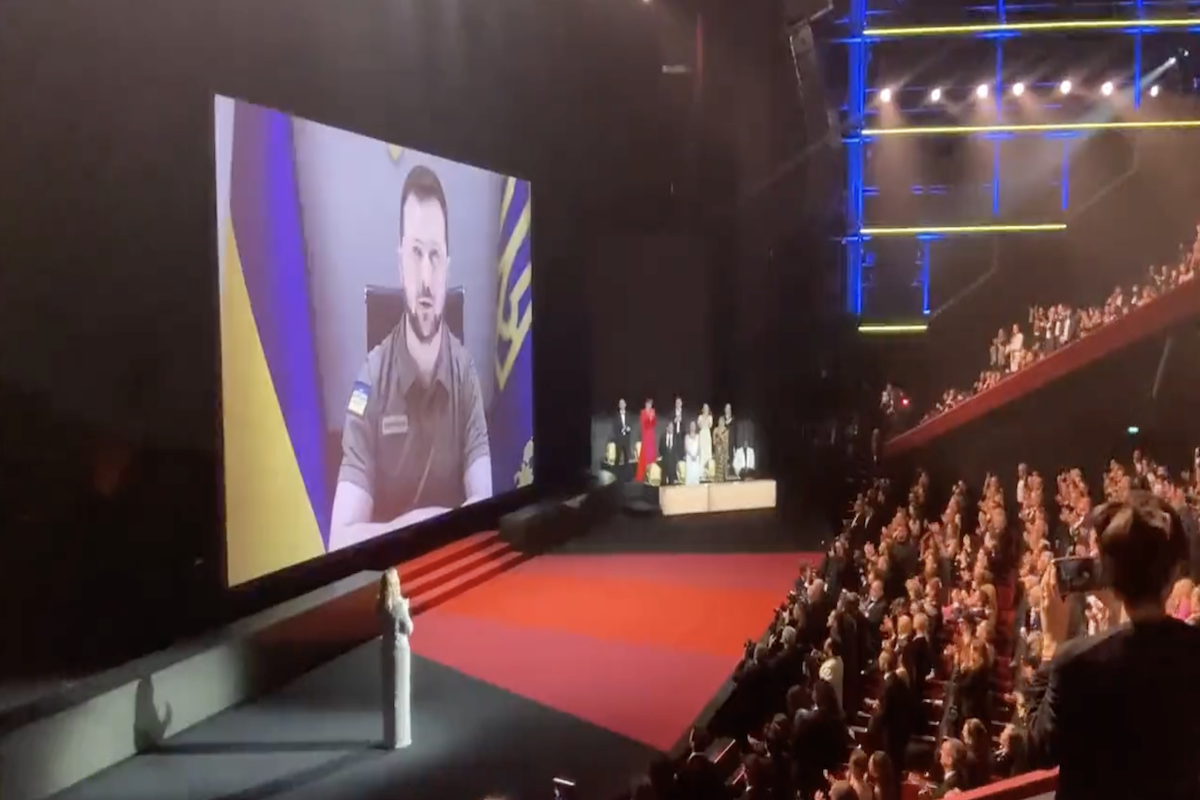Indian film returns to Cannes spotlight after 30 years
After three decades, an Indian film, 'All We Imagine As Light' by Payal Kapadia, shines at Cannes, marking a triumphant return for Indian cinema to the prestigious festival.
For all the stirring rhetoric by Ukraine’s President at Tuesday’s opening ceremony of the Cannes film festival, the fact of the matter must be that cinema has indubitably been impinged by the war in Ukraine.

Ukraine's President at Cannes Film Festival (Photo: Twitter/@MFA_Ukraine)
For all the stirring rhetoric by Ukraine’s President at Tuesday’s opening ceremony of the Cannes film festival, the fact of the matter must be that cinema has indubitably been impinged by the war in Ukraine. Not even the quotes from Charlie Chaplin could enliven the supposedly festive ambience. Not that the grandstanding over President Volodymyr Zelensky’s presence had tensed up the ambience. The seemingly interminable conflict had already had an impact on the festival long before Zelensky’s inaugural presentation. It bears recall that within days of the Russian invasion, Ukraine’s leading filmmakers and producers had appealed to film festival authorities the world over to boycott the Russians, as a sign of protest. In March, the authorities of Cannes had let it be known that they would not “welcome official Russian delegations”. Nor for that matter would they “accept the presence of anyone linked to the Russian government”. However, a supplementary let it be known that they would not ban Russian directors. Incidentally, the Russian director, Kirill Serebren- nikov, is competing with Tcgaikivskys Wife. The authorities have reportedly approved “only a few” Russian media outlets to cover the event. All these outlets have been vehement in their opposition to the war. It was far from clear, however, if any state news outlets had sought accreditation. According to the New York Times, the festival authorities have not responded to emailed queries.
Two films by Ukrainian directors are on the festival’s menu. These are Maksim Nakonechnyi’s Butterfly Vision and Sergei Lozmitsa’s The Natural History of Destruction. But these choices may yet stoke controversies, not the least because the Ukrainian Film Academy had in March expelled Lozmitsa because he did not support its call to boycott Russian films. “When I hear calls to ban Russian films, I think of my Russian friends ~ decent and honourable people,” he said, drawing a fine distinction between cinema and nationalities. And then the punchline that ought to have an impact on people from the Kremlin to Kiev. “We cannot judge people by their passports. They are victims of the war, just like we are.” President Zelensky has underlined the need for a new Charlie Chaplin to prove that today’s cinema is not silent. He was quite obviously referring to Chaplin’s satire of Adolf Hitler at the start of World War II in 1939. “We must be victorious. We need cinema to guarantee this end- ing, that each time it will be on the side of freedom,” said the Ukrainian leader through a live video link. The distressing message from Cannes must be that it is a thin line that divides cinema from conflict. The second ought never to impinge on the first. The clash of shields ought never to bar the cinema buff from stepping inside the auditorium. Cinema evokes appreciation; a war only revulsion.
Advertisement
Advertisement